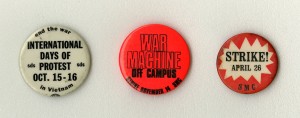
Protest buttons were a common form of expressing dissatisfaction with American involvement in the Vietnam War. Buttons such as these were readily produced and easily distributed, worn by students and the general public alike.
The Vietnam War was one of the most polarizing events in United States history. Protesters angered by a decade of controversial policy decisions in Vietnam opposed what they believed to be an unfair and corrupt political system waging an unpopular war. As the antiwar movement began to gain momentum in the late 1960s and early 1970s, college students took leading roles, protesting not only against the war, but also against conventional forms of authority and social norms. Student protesters embraced a philosophy of free love, and peace and justice for all that had its roots in the radical counterculture movement that started in the early 1960s.
The Vietnam War opened an ideological rift between Americans. The radical ideas of student protesters, and the antiwar movement more broadly, met opposition from the US government, as well as from supporters of the war. Americans on both side of this divide banded together to print and distribute materials across the country in the hopes of gaining support and recognition for their respective causes. The artifacts in this exhibit are drawn from the Radical Pamphlets Collection housed in Gettysburg College’s Musselman Library. These artifacts have been selected to provide a taste of what it might have been like to be a college student during the Vietnam War era.
